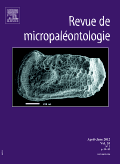
REVUE DE MICROPALEONTOLOGIE
metrics 2024
Bridging Theory and Application in Microfossil Studies
Introduction
REVUE DE MICROPALEONTOLOGIE is a prestigious academic journal published by Elsevier France - Éditions Scientifiques Médicales Elsevier, specializing in the dynamic field of Paleontology. Since its inception in 1979, the journal has established itself as a vital resource for researchers and professionals dedicated to the study of microfossils and their implications for understanding historical climate changes and biodiversity. With an impressive ranking of Q3 in the Paleontology category and a Scopus rank placing it in the mid-range of its peers, REVUE DE MICROPALEONTOLOGIE serves as an essential platform for disseminating cutting-edge research. While currently not open access, the journal ensures that its content is accessible to a wide audience through various library affiliations. By bridging the gap between theoretical research and practical applications, this journal contributes significantly to advancing knowledge in Earth and Planetary Sciences, making it a valuable tool for students and seasoned researchers alike.
Metrics 2024
 0.32
0.32 0.70
0.70 1.30
1.30 34
34Metrics History
Rank 2024
Scopus
IF (Web Of Science)
JCI (Web Of Science)
Quartile History
Similar Journals
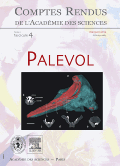
COMPTES RENDUS PALEVOL
Innovative Research Shaping the Future of PaleontologyCOMPTES RENDUS PALEVOL, published by ACAD SCIENCES in France, stands as a pivotal journal in the field of paleontology. With an ISSN of 1631-0683 and an E-ISSN of 1777-571X, this esteemed publication provides a platform for innovative research and scholarly discourse, contributing significantly to the understanding of Earth's biological history. Having achieved a commendable Q2 rank in the 2023 Paleontology category and positioned at Rank #63 out of 113 in the Scopus Earth and Planetary Sciences segment, it underscores its relevance and influence in the scientific community. The journal's converged years from 2002 to 2024 reflect a commitment to ongoing research and knowledge dissemination. Although currently lacking open access options, the journal's rigorous peer-review process ensures the integrity and quality of published articles, making it an essential resource for researchers, professionals, and students striving to explore and expand their expertise in paleontological sciences.
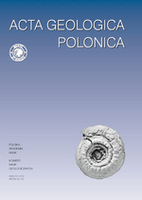
ACTA GEOLOGICA POLONICA
Advancing geological knowledge for a sustainable future.ACTA GEOLOGICA POLONICA is a distinguished journal published by the Polska Akademia Nauk, in collaboration with the University of Warsaw's Geology Department. Since its inception, it has served as a vital platform for disseminating innovative research in the field of Geology, reflecting a commitment to advancing scientific knowledge in Earth and planetary sciences. With an ISSN of 0001-5709 and an E-ISSN of 2300-1887, this journal provides a rigorous review process and is classified in the Q3 quartile for Geology as of 2023, indicating its growing influence in the discipline. Despite not being open access, the journal facilitates meaningful contributions that span a range of geological topics from fundamental research to applied sciences, thereby enriching the academic landscape. Researchers, professionals, and students alike are encouraged to engage with the valuable findings and discussions contained within its pages, which continue to shape the future of geological inquiry.

BULLETIN OF THE GEOLOGICAL SOCIETY OF DENMARK
Exploring Earth's History Through Danish PerspectivesBULLETIN OF THE GEOLOGICAL SOCIETY OF DENMARK, published by the Geological Society of Denmark, serves as a key platform for the dissemination of original research and comprehensive reviews related to geological studies in Denmark and beyond. With an ISSN of 2245-7070, this journal provides a significant avenue for sharing findings that contribute to our understanding of geological processes, resources, and the history of the Earth. Although it operates under traditional access options, the journal encourages a rich scholarly dialogue among researchers, professionals, and students alike. Its impact is evident in the broad scope it covers, catering to diverse areas of geology, including but not limited to sedimentology, paleontology, and environmental geology. By fostering an environment of knowledge sharing, the BULLETIN OF THE GEOLOGICAL SOCIETY OF DENMARK is not just a journal; it is a vital resource for anyone invested in advancing geological science.
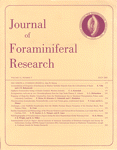
JOURNAL OF FORAMINIFERAL RESEARCH
Exploring Earth's History Through Foraminiferal InsightsJOURNAL OF FORAMINIFERAL RESEARCH is a premier academic journal published by the Cushman Foundation for Foraminiferal Research, dedicated to advancing the field of foraminiferal studies within the broader disciplines of paleontology and microbiology. Established in 1979, this journal has been a vital publication for researchers aiming to explore the intricate relationships between foraminifera and their environments, contributing to a deeper understanding of earth's history. With a Q4 ranking in Microbiology and a Q3 ranking in Paleontology as of 2023, it plays an essential role in shaping scholarly discourse in these areas. Although it currently does not offer open access, the journal remains a valuable resource for scientists, professionals, and graduate students eager to engage with contemporary research findings and methodologies. The subtle interconnections between foraminiferal research and broader ecological implications underscore the journal's commitment to fostering academic inquiry, making it an indispensable ally for those invested in the ongoing scientific exploration of our planet.
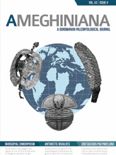
AMEGHINIANA
Unraveling the Mysteries of Evolution and EcologyAMEGHINIANA is a distinguished academic journal published by the ASOCIACION PALEONTOLOGICA ARGENTINA, serving as a vital platform for the dissemination of cutting-edge research in the fields of Ecology, Evolution, Behavior and Systematics, as well as Paleontology. With its ISSN 0002-7014 and E-ISSN 1851-8044, the journal has established itself as a key reference point for scholars seeking to explore the intricate relationships within ecological systems and the evolutionary history of species. Despite not offering open access, AMEGHINIANA maintains a reputation bolstered by a Q3 ranking in both its subject categories, underlining its sustained commitment to enhancing scientific knowledge. Researchers and professionals alike benefit from this journal’s extensive archive of studies dating back to 1985, with ongoing contributions expected until 2024. With a focus on high-quality content, this journal is essential for anyone immersed in the study of paleobiology and ecological systems.
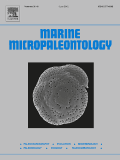
MARINE MICROPALEONTOLOGY
Charting the Course of Oceanic EvolutionMARINE MICROPALEONTOLOGY, published by Elsevier, is a prestigious journal that has been at the forefront of research in the fields of Oceanography and Paleontology since its inception in 1976. Renowned for its high-impact contributions, the journal is classified in Q2 in Oceanography and Q1 in Paleontology, reflecting its significant role in advancing knowledge and understanding within these scientific domains. With an impressive Scopus ranking—27th in Paleontology and 53rd in Oceanography—this journal serves as an invaluable platform for researchers and professionals to disseminate their findings on marine microfossils and their implications for paleoenvironmental reconstructions. While the journal is not open access, its rigorous peer-review process ensures that published articles maintain the highest scientific standards. Researchers, professionals, and students alike are encouraged to explore the latest insights and discoveries that shape our understanding of marine ecosystems through the pages of MARINE MICROPALEONTOLOGY.

Paleoceanography and Paleoclimatology
Illuminating the Past to Understand Our FuturePaleoceanography and Paleoclimatology, published by the American Geophysical Union, is an esteemed open-access journal dedicated to advancing the fields of atmospheric science, paleontology, and oceanography. With an impressive Q1 ranking in all these categories for 2023, the journal is recognized for its impactful contribution, housing research that explores the intricacies of ancient oceanic and climatic systems from 2018 to 2024. Researchers benefit from its robust Scopus rankings, placing it among the top publications in both paleontology and oceanography, with ranks of #5 and #21, respectively, showcasing its significance in the academic community. The journal provides a vital platform for groundbreaking studies that address critical questions regarding Earth's historical climate and ocean processes, making it an essential resource for researchers, professionals, and students alike.
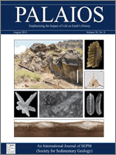
PALAIOS
Connecting the Dots Between Past and PresentPALAIOS is a renowned journal published by the SEPM-Society for Sedimentary Geology, focusing on the interdisciplinary fields of paleontology and sedimentary geology. Established in 1986, this scholarly publication serves as a vital platform for disseminating innovative research and insightful reviews that bridge ecological and evolutionary aspects with paleontological studies. With an impressive track record, the journal has achieved a commendable impact factor and consistently holds a Q2 ranking in both Ecology, Evolution, Behavior and Systematics and Paleontology as of 2023. Researchers and professionals will benefit from the diverse range of studies presented, which encompass fossil analysis, stratigraphy, and the impacts of climate change on past ecosystems. By being at the forefront of research and education in these fields, PALAIOS not only enhances comprehension of historical biodiversity patterns but also informs contemporary ecological theories.
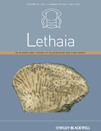
LETHAIA
Shaping the Future of Earth's Biological NarrativesLETHAIA, an esteemed journal published by Scandinavian University Press - Universitetsforlaget AS, serves as a vital platform for the dissemination of innovative research in the fields of paleontology as well as ecology, evolution, behavior, and systematics. Established in 1968 and continuing its impactful journey until 2024, LETHAIA has consistently contributed to advancing scientific understanding of Earth's biological and geological history. With a 2023 impact factor placing it in the Q2 category for both Paleontology and Ecology, Evolution, Behavior and Systematics, the journal is recognized for its high-quality, peer-reviewed articles that engage and challenge the academic community. Researchers, professionals, and students alike will find LETHAIA to be an indispensable resource for the latest findings, methodologies, and theoretical advancements in these interlinked disciplines.

PalZ
Unlocking the Mysteries of Evolutionary ChangePalZ is a prestigious academic journal in the field of Paleontology, published by Springer Heidelberg in Germany. With a long-standing history that traces back to its converged years from 1914 to 2024, this journal offers invaluable insights into the evolutionary dynamics and ecological relationships of past life forms. Holding a commendable impact factor and ranked in the Q2 category of Paleontology, it consistently showcases high-quality research that resonates within the scientific community, evidenced by its Scopus rank of #38 out of 113 in Earth and Planetary Sciences. PalZ is committed to open access, ensuring that its rich repository of scholarly articles is readily accessible for researchers, professionals, and students alike. By engaging with the journal, readers will encounter cutting-edge studies that are pivotal for advancing our understanding of paleobiology and the historical patterns of biodiversity.